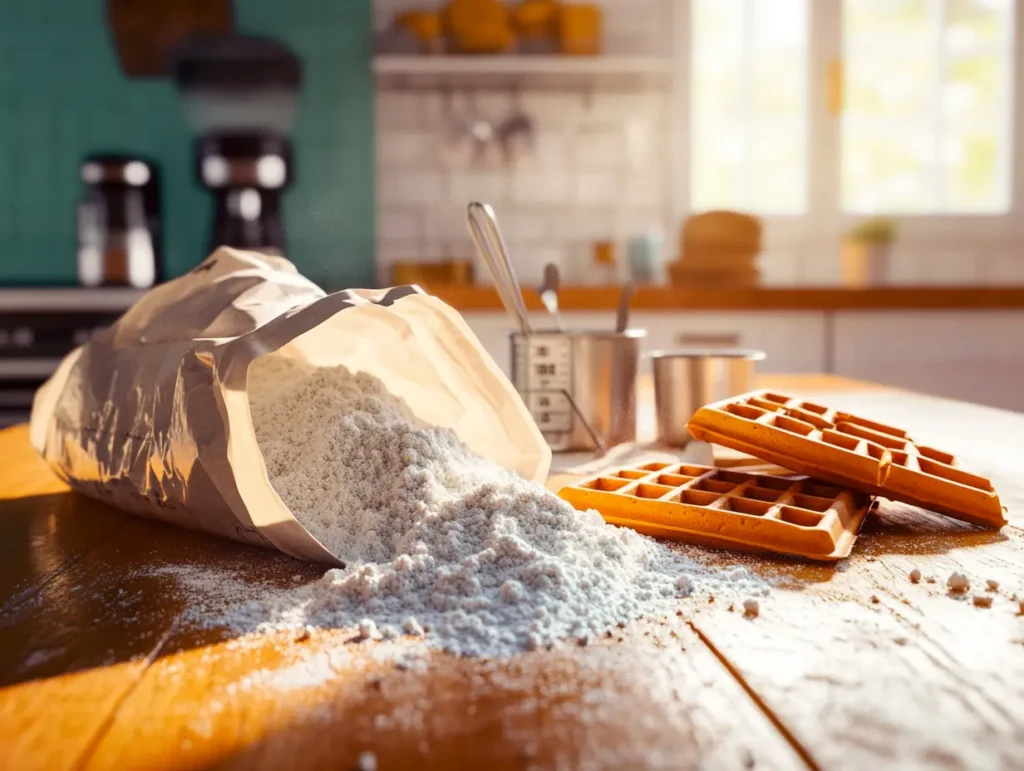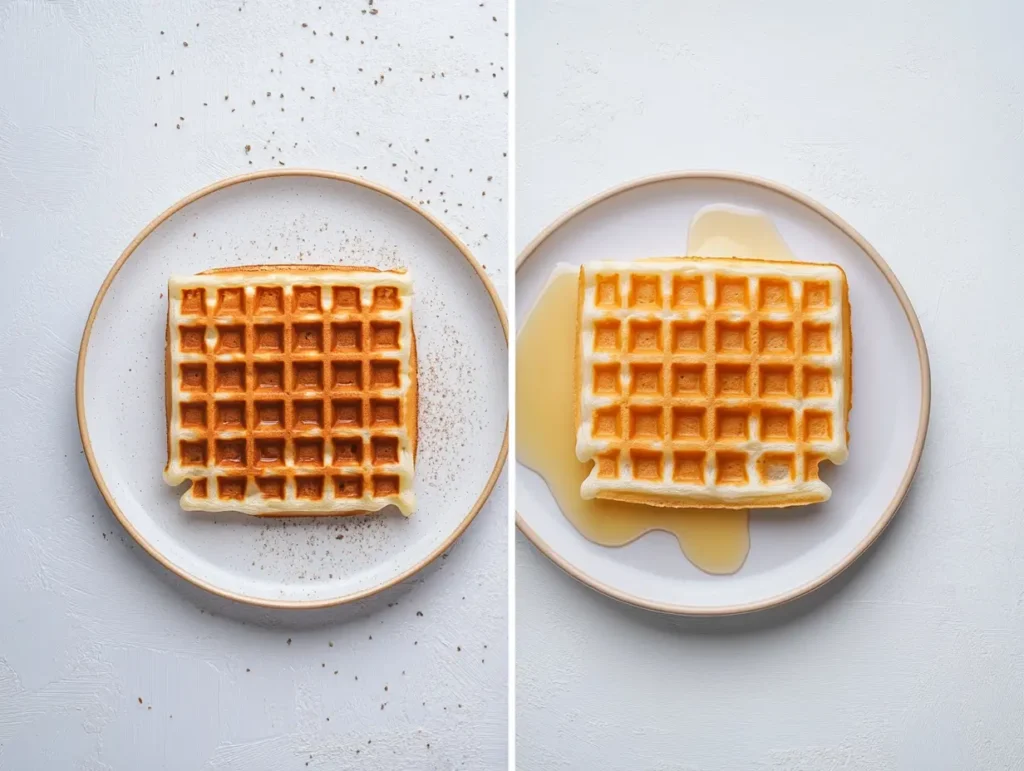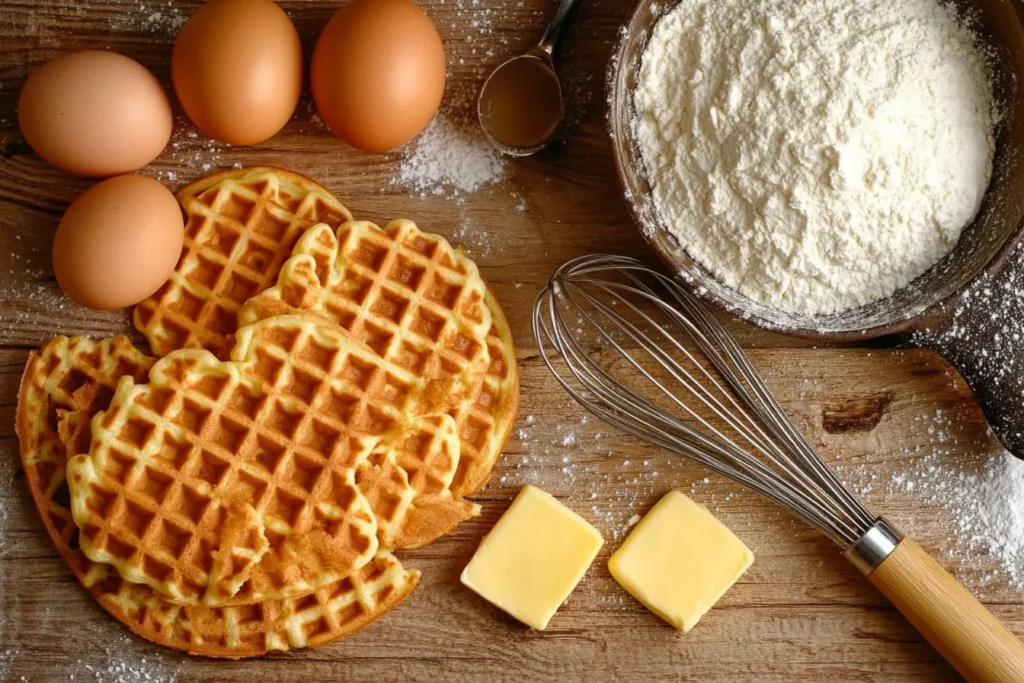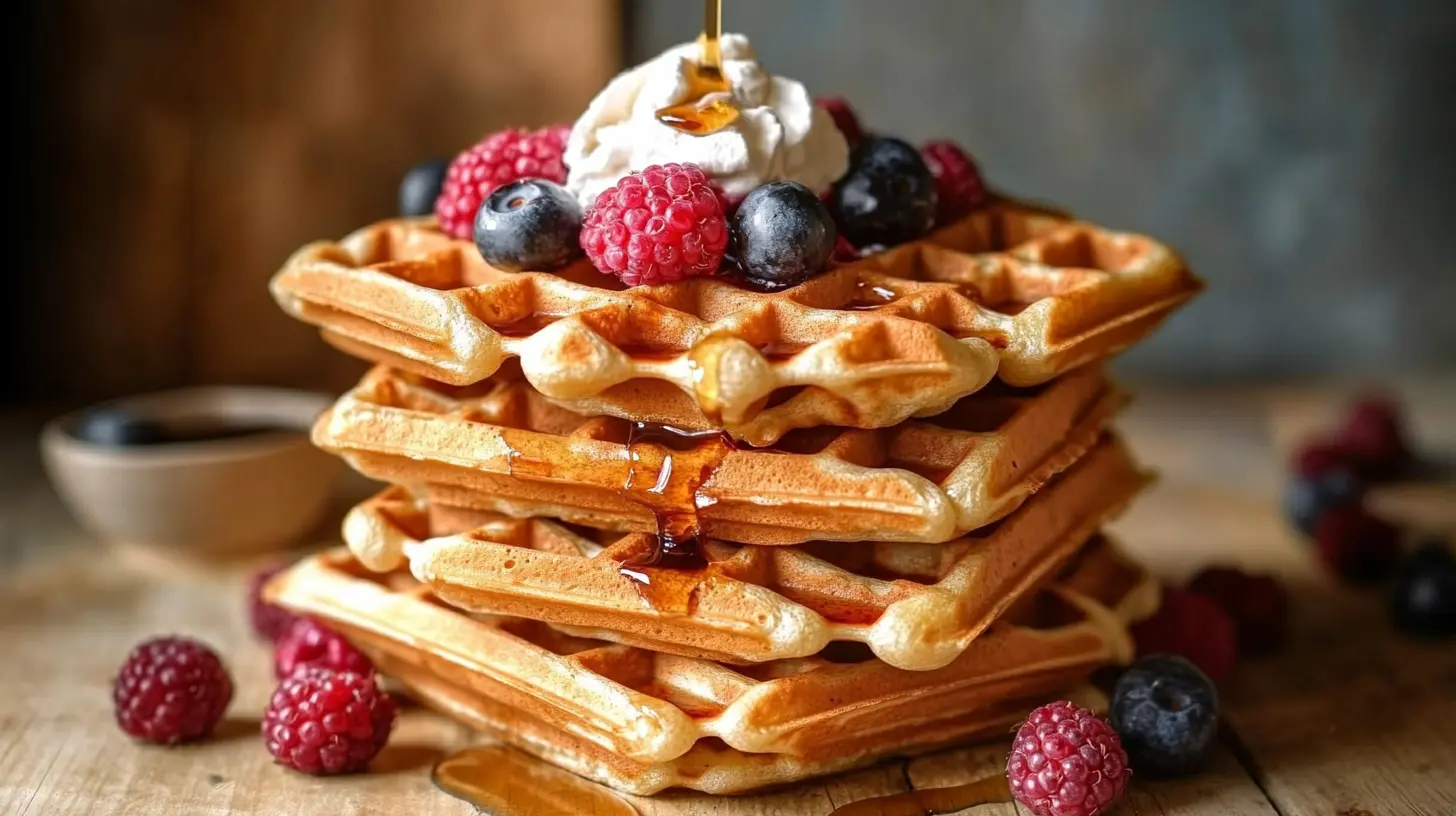Have you ever wondered what makes a waffle perfect? Is it the golden-brown crispiness, the fluffy interior, or maybe the subtle flavor that complements your favorite toppings? 🧇 While there’s no denying the role of a good waffle iron, the type of flour you use is just as important. Let’s dive deep into the world of waffle flour to discover which one reigns supreme and why it matters so much!
The Art of Waffle Making
Waffles are a breakfast favorite worldwide, loved for their crispy edges and soft, airy insides. But making the perfect waffle isn’t just about following a recipe. It’s about choosing the right ingredients, especially the flour. The wrong type of flour can lead to dense, chewy waffles instead of the light and fluffy ones we all crave. So, what flour is best for waffles? Let’s break it down!
Understanding Flour Basics: Why Flour Matters for Waffles
To understand what makes one type of flour better than another for waffles, we first need to know what flour actually is and how it works in recipes. Think of flour as the foundation of your waffle—it’s the ingredient that holds everything together while creating texture and structure.
What is Flour Made Of?
Flour is essentially finely ground grains, most commonly wheat. It contains two main proteins: glutenin and gliadin. When combined with water, these proteins form gluten, which gives structure to baked goods. The amount of gluten formed depends on the type of flour, and this is where things get interesting for waffles.
“The right flour is like the canvas for your masterpiece waffle—it sets the stage for greatness.”
Types of Flour Commonly Used in Baking

There are several types of flour, each with its unique characteristics. Here’s a quick rundown:
- All-Purpose Flour: The jack-of-all-trades in baking. It has moderate protein content, making it suitable for a variety of recipes, including waffles.
- Cake Flour: Known for its low protein content, cake flour creates delicate and fluffy textures. Ideal for soft waffles.
- Whole Wheat Flour: Packed with nutrients, but it can make waffles denser if not used properly.
- Gluten-Free Flours: These include almond, coconut, and rice flours, designed for those with gluten sensitivities.
Key Factors in Choosing Flour for Waffles
Choosing the best flour for waffles isn’t just about picking one off the shelf. You need to think about texture, flavor, and even how your waffle iron interacts with the batter. If you’re curious about how different flours impact pancake batter, check out What Kind of Flour is Best for Pancakes? for a comparison. Let’s look at the key factors to consider.
Texture and Protein Content
Flour’s protein content determines how much gluten forms in the batter. High-protein flours (like bread flour) produce chewy textures, which might be great for bread but not for waffles. For light and airy waffles, stick with low- to medium-protein flours like all-purpose or cake flour.
Gluten Levels and Their Impact
Gluten is like the glue that holds your waffle together. Too much gluten can make your waffle rubbery, while too little might cause it to fall apart. That’s why finding the right balance is crucial. Cake flour has low gluten, creating waffles that are tender and fluffy.
Flavor Considerations
Flour also influences the flavor of your waffle. While all-purpose flour offers a neutral taste, whole wheat flour adds a nutty flavor. Gluten-free options like almond flour can lend a subtle sweetness, perfect if you’re experimenting with flavors.
Pro Tip: Start with All-Purpose Flour
If you’re unsure which flour to choose, begin with all-purpose flour. It’s versatile and provides a balanced texture, making it a great starting point for waffle beginners. Once you’re comfortable, you can experiment with other flours to suit your taste and dietary needs.
Comparing Flour Types for Waffles
Now that we’ve laid the groundwork, it’s time to dive into the specifics of different flours. Each type has its strengths and weaknesses, depending on what kind of waffles you want to make. Let’s explore the most popular options and see how they stack up! 🧇
All-Purpose Flour: The Versatile Choice
If flour were a Swiss Army knife, all-purpose flour would be it. This kitchen staple has a balanced protein content of about 10-12%, making it adaptable for various recipes.
- Texture: Provides a good balance of fluffiness and crispiness.
- Flavor: Neutral, so it works well with any toppings or mix-ins.
- Ideal For: Beginners or those looking for a no-fuss option.
“All-purpose flour is like the reliable best friend of your waffle batter—it never disappoints.”
Cake Flour: For Light and Fluffy Waffles
Dreaming of waffles that feel like eating a cloud? Cake flour is your go-to. With a lower protein content (around 7-9%), it creates a super tender and airy waffle.
- Texture: Ultra-soft and delicate.
- Flavor: Mild, allowing toppings to shine.
- Pro Tip: Use cake flour when you want waffles to pair with rich toppings like whipped cream or fruit compote.
Whole Wheat Flour: A Nutritious Option
Whole wheat flour is perfect if you’re looking to add a health kick to your waffles. Packed with fiber and nutrients, it has a robust flavor that sets it apart.
- Texture: Can be denser than other flours.
- Flavor: Nutty and slightly earthy.
- Ideal For: Health-conscious eaters or savory waffle recipes.
💡 Tip: Mix whole wheat flour with all-purpose flour for a lighter texture without sacrificing nutrition.
Gluten-Free Flour Alternatives
Whether you’re gluten-intolerant or experimenting with new flavors, gluten-free flours offer plenty of options. Popular choices include almond flour, coconut flour, and rice flour.
- Texture: Varies widely. Almond flour tends to be moist, while coconut flour is drier.
- Flavor: Adds unique notes like nuttiness or mild sweetness.
- Ideal For: Those with dietary restrictions or adventurous palates.
Bleached vs. Unbleached Flour for Waffles

When strolling down the flour aisle, you’ve probably noticed the terms “bleached” and “unbleached.” But what do they mean, and do they really matter for waffles? Let’s find out!
Differences Between Bleached and Unbleached Flour
- Bleached Flour: Chemically treated to whiten and soften it. This process alters the protein structure, making it great for tender waffles.
- Unbleached Flour: Naturally aged, retaining a slightly denser texture. It’s less processed but might not yield waffles as soft as bleached flour.
“Think of bleached flour as the sprinter—it works quickly and efficiently, while unbleached flour is the marathon runner, steady and natural.”
Which Option is Better for Waffles?
If you’re after light and fluffy waffles, bleached flour is a solid choice. However, if you prefer a more natural product with minimal processing, unbleached flour can still deliver excellent results.
Common Problems and Solutions in Waffle Making
Even with the perfect flour, waffles can sometimes misbehave. Don’t worry—we’ve all been there! Here are some common issues and their solutions to ensure waffle success every time. 🎉
Why Are My Waffles Not Light and Fluffy?
This is one of the most frequent waffle woes. The culprit is often overmixing the batter.
- Problem: Overmixing develops too much gluten, resulting in dense waffles.
- Solution: Mix the batter just until combined. It’s okay if there are a few lumps—they’ll work themselves out during cooking.
What Causes Tough or Dense Waffles?
Tough waffles can ruin your breakfast vibes. Here’s why it happens:
- Problem: Using high-protein flour like bread flour or letting the batter sit too long.
- Solution: Stick to low- or medium-protein flours like all-purpose or cake flour. Cook the batter immediately after mixing for the best texture.
Tips to Achieve Perfect Waffle Texture
- Measure Flour Correctly: Always spoon flour into your measuring cup and level it off to avoid packing in too much.
- Use Buttermilk: The acidity in buttermilk reacts with baking soda, adding extra fluffiness.
- Preheat Your Waffle Iron: A hot waffle iron ensures even cooking and prevents sticking.
“Making waffles is like dancing—timing, balance, and the right moves make all the difference.”
Nutrition Facts Table
Here’s a quick guide to the approximate nutritional values of waffles made with different flours. 🥞
| Flour Type | Calories (per serving) | Protein | Fiber |
|---|---|---|---|
| All-Purpose Flour | 150 | 4g | 1g |
| Cake Flour | 140 | 3g | 0.5g |
| Whole Wheat Flour | 160 | 6g | 3g |
| Almond Flour (Gluten-Free) | 180 | 6g | 3.5g |
Frequently Asked Questions (FAQ)
Let’s tackle some of the most common waffle-related questions. Whether you’re new to waffle-making or a seasoned pro, these answers might surprise you!
What Kind of Flour Do You Use for Waffles?
The best flour depends on what you’re aiming for. All-purpose flour is a fantastic all-rounder, but cake flour creates lighter, fluffier waffles. For a healthier twist, you can try whole wheat or almond flour.
“Think of it as choosing the right shoes for an occasion—different flours suit different needs.”
What is the Secret to Making Good Waffles?
The secret lies in balancing the ingredients. Use high-quality flour, don’t overmix the batter, and make sure your waffle iron is preheated. For more expert tips, explore What is the Secret to Making Good Waffles?. Adding buttermilk or separating the egg whites and folding them in can take your waffles to the next level!
Why Are My Waffles Not Light and Fluffy?
Flour choice, overmixing, and incorrect cooking temperature are the usual culprits. Opt for a low-protein flour like cake or all-purpose flour and avoid vigorous mixing.
Do You Use Bleached or Unbleached Flour for Waffles?
Bleached flour is better for softer, lighter waffles. Unbleached flour works well for those who prefer natural options and don’t mind a slightly denser texture.
Tips for Selecting the Right Flour for Your Waffle Recipe

Choosing the best flour can feel overwhelming with so many options available. Here are some practical tips to make the decision easier:
Adapting Recipes Based on Flour Choice
Each type of flour behaves differently, so tweak your recipe as needed. For instance:
- Cake Flour: Add a bit less liquid to maintain the right consistency.
- Whole Wheat Flour: Mix with all-purpose flour in a 50:50 ratio for lighter waffles.
- Gluten-Free Flour: Use a pre-mixed blend or add xanthan gum for structure.
Experimenting with Flour Blends
Why settle for one flour when you can mix them? Combining flours lets you enjoy the best of both worlds. Try blending:
- All-purpose and cake flour for soft yet sturdy waffles.
- Whole wheat and almond flour for a hearty, nutty flavor.
“Mixing flours is like creating your own signature waffle style!”
Check for Freshness
Old flour can ruin the flavor and texture of your waffles. Always check the expiration date, and store your flour in a cool, dry place.
Conclusion: Choosing Your Ideal Flour for Waffles
So, what’s the verdict? The best flour for waffles depends on your goals. For classic, fluffy waffles, stick with all-purpose or cake flour. For something more adventurous, whole wheat or almond flour can add unique flavors and nutrients.
“The best flour is the one that makes your taste buds dance and your waffles sing!”
Bonus Recipe: Perfect Waffles with the Right Flour
Here’s a simple yet delicious recipe to put everything we’ve learned into action. 🎉
Ingredients
| Ingredient | Quantity |
|---|---|
| All-Purpose Flour | 2 cups |
| Baking Powder | 2 teaspoons |
| Sugar | 2 tablespoons |
| Salt | 1/2 teaspoon |
| Eggs | 2 |
| Buttermilk | 1 3/4 cups |
| Unsalted Butter (melted) | 1/2 cup |
| Vanilla Extract | 1 teaspoon |
Instructions
- Preheat Your Waffle Iron: Make sure it’s nice and hot for even cooking.
- Mix the Dry Ingredients: In a large bowl, whisk together the flour, baking powder, sugar, and salt.
- Prepare the Wet Ingredients: In another bowl, beat the eggs, then add the buttermilk, melted butter, and vanilla extract.
- Combine and Fold: Gradually add the wet ingredients to the dry, mixing until just combined. A few lumps are okay—don’t overmix!
- Cook the Waffles: Pour the batter into your preheated waffle iron and cook until golden brown.
- Serve and Enjoy: Top with syrup, fresh fruit, or whipped cream. 🫐🍯
Nutrition Facts (Per Waffle)
| Calories | Protein | Carbs | Fat |
|---|---|---|---|
| 250 | 6g | 30g | 10g |
Now you’re equipped to create the most amazing waffles your family and friends have ever tasted. The only question is—what toppings will you choose? 😊

Perfect Waffles
Ingredients
Method
- Preheat Your Waffle Iron: Make sure it’s nice and hot for even cooking.
- Mix the Dry Ingredients: In a large bowl, whisk together the flour, baking powder, sugar, and salt.
- Prepare the Wet Ingredients: In another bowl, beat the eggs, then add the buttermilk, melted butter, and vanilla extract.
- Combine and Fold: Gradually add the wet ingredients to the dry, mixing until just combined. A few lumps are okay—don’t overmix!
- Cook the Waffles: Pour the batter into your preheated waffle iron and cook until golden brown.
- Serve and Enjoy: Top with syrup, fresh fruit, or whipped cream.
